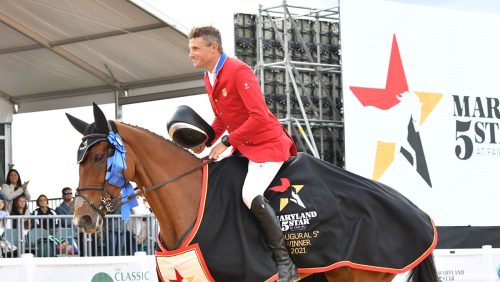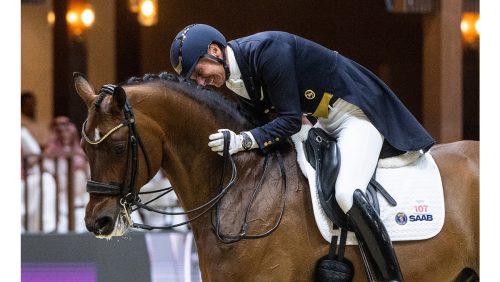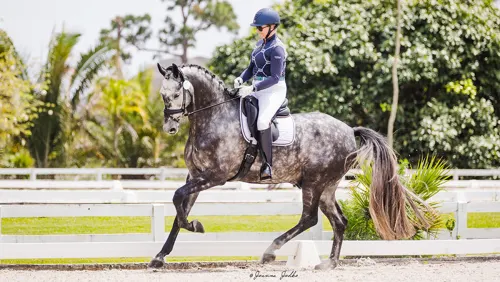The Alltech FEI World Equestrian Games were the center of our attention, but we faced more than that.
Stormy weather and bumpy rides were the trademarks for American dressage in the first third of 2010. Accidents and poor health riddled our best and brightest, and bad luck often accompanied us.
At the Palm Beach Exquis Masters (Fla.), Tip Top and Leslie Morse won the Grand Prix Special, but the joy was short-lived, since TT colicked at a subsequent show and had to have surgery. He did recover, however, and so well that he was able to compete in the trials for the Alltech FEI World Equestrian Games.
Courtney King’s head injury from a horse falling on her in early March has changed the way we think about safety helmets. Miraculously, Courtney woke up from a long coma, and her recovery amazes those surrounding her daily. Every time I see her, she looks stronger and moves more easily. Courtney is enveloped in a positive aura that could inspire anybody to go beyond what they thought were their limitations.
In July Betsy Berrey, a U.S. Equestrian Federation senior dressage judge, educator and columnist, lost her battle with cancer. We will miss her bright smile and her encouraging attitude for a long time.
The loss of the Young Horse Champion Cabana Boy to a fractured knee was a hard blow to breeder-owner Hilltop Farm, rider Christopher Hickey, and to our future high-performance squad, since he looked like a tremendously promising horse. Guenter Seidel had a bad fall just after getting to Germany with his horse, but the latest news on Guenter is very good: The hardware remaining from the first operation has been removed, he’s healing well, and he’ll be back on track this year.
Larger Than The Rest
Looming larger than everything in the past year, though, was the great Moorlands Totilas, who won all the gold medals at the WEG. Thrilled as we were to welcome him to America for the WEG, we never expected the saga of the wonder stallion and Edward Gal to reach its finale on our soil. The rumors of his sale were rampant in the stables during the Games, but most of us took it as “equidirt.” We even asked Edward about it, and he appeared clueless, so we wrote it off as a bad joke.
Well, when the news did break shortly after the Games, the speculation was all about which German would get the ride. That mystery was solved in late November, and the brave young rider behind the curtain was revealed with fanfare to be Matthias Alexander Rath. So it looks like we will be up against Totilas again in the 2012 London Olympic Games, but with a different flag on his saddle pad.
Time will tell if that kind of bond Gal had with the stallion can be built between Totilas and his new rider. If so, it would be nice for the horse, who is a cool and kind animal, but I know many people doubt that we will ever see the magic of Edward and Totilas recreated.
ADVERTISEMENT
Meanwhile, our own superstar, Ravel, went home to California after winning the Grand Prix at the Exquis Masters in Palm Beach in February and then remained on the West Coast until after our selection trials. There was considerable pressure from Europe on both Steffen Peters and the U.S. Equestrian Federation to send Ravel to the FEI World Cup Final and to the CDIO Aachen (Germany). Steffen and I discussed the matter several times, and, although Steffen was eager to attempt a repeat of their triumphs in 2009, when he and Ravel were the champions at both events, he listened to my arguments against such a 2010 campaign. When you have only one outstanding horse available and the WEG at home in September, risking his health and welfare on overseas trips was not my idea of a good investment. Ravel’s owner, Akiko Yamazaki, was very understanding, and with 20/20 hindsight and two individual medals, our decision proved to have been the correct one.
Working with our team members at Gladstone and in Kentucky before and during the WEG was a great experience for me, and afterwards the athletes unanimously agreed that the new pre-game program was helpful to them. Todd Flettrich, Tina Konyot and Katherine Bateson-Chandler each had very respectable U.S. team debuts. In spite of the additional pressure of playing on their home court, they came through with flying colors.
All our team members fulfilled every one of my expectations.
Thanks to their fourth-placed finish, we’re now qualified for the 2012 London Olympics, and that’s coming up sooner than we think. In less than 20 months, we’ll be leaving for England, so our preparations commenced as soon as the WEG ended. In early November, we had a first athletes’ conference call, with invitations to all the riders listed on our developing lists to participate. On this call, I outlined the high performance plans for 2011, and we received some valuable input from the athletes, who normally don’t have such a voice. One thing that we again emphasized was that all our high-performance riders have representatives appointed to the USEF Active Athletes Committee, who can and will speak for them on conference calls. Their suggestions are then forwarded to the High Performance Committee and are always treated as a priority by the committee and the staff.
Those lucky American riders who have a good Grand Prix horse and can fund a campaign in Europe are advised to start planning their European showing/training tour early to get enough shows in before Aachen to have a chance to be on the U.S. team there. A strong U.S. presence at Aachen this year is essential to showcase and gain experience for our team hopefuls.
Another goal for Grand Prix riders with an eye on the Olympics has to be this year’s National Grand Prix Championships, which will be run in conjunction with the Pan Am Games trials in September. The championships will give us a clear view of which horses we need to keep an eye on and promote heading toward London. It can get crowded on the European show circuit, and only a limited number of American entries are invited to each international show, so we have to use those spots judiciously. But in the best of all worlds we’ll have a hard time choosing between all our candidates!
The Pan Am Games horses do not need to be seen in Europe next year, but some of them will accompany their Grand Prix stablemates overseas. The ones who stay behind will be busy with qualifying shows all winter and spring. We will try to organize clinics to support their efforts without colliding with their show schedules, which proved a problem during the past year.
The Reem Acra FEI World Cup Final is another focal point, and this year we fully intend to have at least one American rider representing us in Leipzig (Germany) at the end of April. With the support of the most prominent organizers in California and some of the competitors, we have managed to restore World Cup-qualifying shows to the West Coast in time for the 2011 season. This gives riders opportunities to qualify on both coasts.
From The Bottom Up
Although national competitions are not my main responsibility, I promised the athletes who interviewed me for the position as technical advisor to keep a close eye on what’s happening at all levels, from grassroots on up. Our bottom layer is our foundation, and without it growing and developing, we’ll always be searching for a team at the last minute, as we often seem to do. Hoping that someone will buy or lease a horse for us in the 11th hour is not a scenario we want to continually rely on.
ADVERTISEMENT
We have to stop being consumers of horses from abroad and start producing them here. No longer do they roll out the red carpet when we go horse shopping in Europe. The dollar is weak, and we cannot afford the best of the trained or half-trained horses offered to us. We will never win a gold medal on European hand-me-downs!
We have the know-how among American trainers to guide new riders and green horses to international success. Our present economy may force us to put my belief to the test. Although we owe a lot to European expertise and will continue to seek their advice, being forced to rely more on ourselves would be a good thing in the long run.
At the beginning of last year, we were lucky to have Debbie McDonald named as our developing rider coach, and after some delay we’ve now appointed Jeremy Steinberg the USEF youth coach. Jeremy is young and enthusiastic and has an impressive record working with juniors and young riders. I initiated and stubbornly supported the idea of getting a youth coach in place—because we have to start somewhere.
Now we need to find the finances to support the program Jeremy has outlined. In addition to looking for sponsorship, one possible avenue is to combine the clinic efforts of the USEF and the USDF, since our aim is the same: better education and guidance for U.S. dressage riders.
Don’t Just Whine
In December 2009, the FEI appointed a revised Dressage Committee. It now consists of six members, including the chairman. There is one trainer (David Hunt), one rider (Margit Otto-Crepin), one judge (me), one former chef d’equipe (Elisabeth Lundholm) and two organizers (Thomas Baur and Frank Kemperman, who is our fearless leader.)
Although the committee members do not answer directly to their corresponding stakeholders, we naturally tend to look after our own and address their concerns. The committee met once a month in conference calls and had two in-person meetings in 2010. We also hosted three open meetings—one at the World Cup Final in the Netherlands, one in Aachen, and one during the WEG. The first two were very productive, with a healthy dialogue and sensible suggestions, but the meeting in Kentucky deteriorated into a whining session about judging, which, whether it had merit or not, I did not consider appropriate in the middle of the WEG.
An additional complaint was that the Dressage Committee does not communicate enough of its information to the stake-holders. The fact is, though, that the FEI office sends out the agenda before each meeting, and it then delivers a summary of the minutes to all the clubs and national federations. If anyone
has an issue, Trond Asmyr can be found at the FEI office, and none of us Dressage Committee members are impossible to reach or unwilling to communicate.
During the past year, the committee has made every effort to comply with the edicts of the FEI Task Force, some of which are not so easy to realize. In addition, we have lived through hours of rule changes and revisions. For the competitors, we’ve made a change in the World Ranking list that includes extra points for championships and better balances the different tests. It also works better worldwide. There will now be a straight draw for the Grand Prix at World Cup qualifiers, which I know makes the organizers crazy. But it is much more fair to riders all over the world.
Numerous changes, checks and balances, and educational programs are being initiated to help dressage judges improve and cope with the recent demands on our perfection. The details are too many to deal with in this column. Suffice it to say that judging is facing a whole new dawn, but so far it looks like a long haul to sunrise.
Anne Gribbons moved to the United States from Sweden in 1972 and has trained more than a dozen horses to Grand Prix. She rode on the 1986 World Championships dressage team and earned a team silver medal at the 1995 Pan American Games. An O-rated dressage judge based in Chuluota, Fla., Gribbons serves as a longstanding member of the USEF High Performance Committee and is on the FEI Dressage Committee. She started contributing to Between Rounds in 1995.















